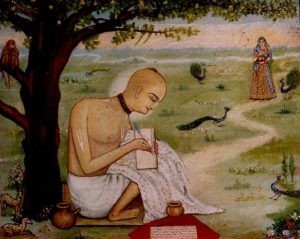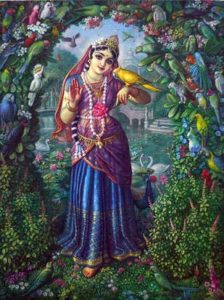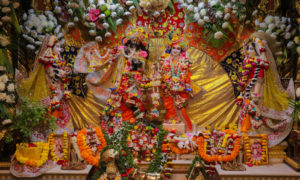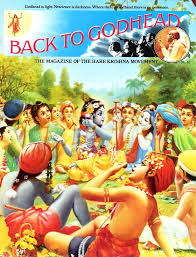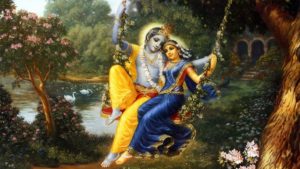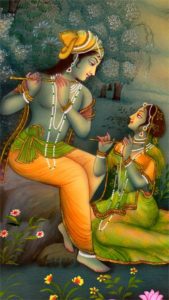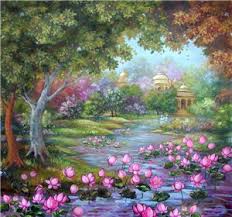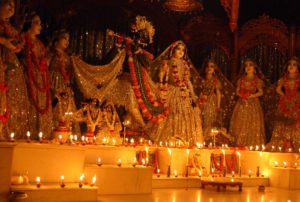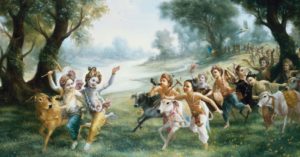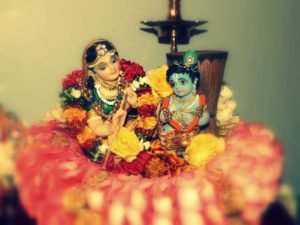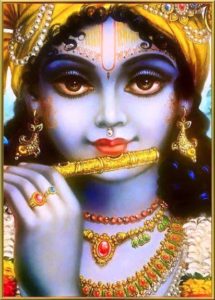Hare Krishna,
5th December, 2016. Gurgaon
The word Rupanuga
The common Gauòéya Vaiñëava understanding is that the word rupanuga was first used by Çréla Raghunätha däsa Gosvämé in the last verse of his Çré Manaù–Çiksä:
manaù-çikñä-daikädaçaka-varam etaà madhurayä
girä gäyaty uccaiù samadhi-gata-sarvärtha-tati yaù
sa-yüthaù çré-rüpänuga iha bhavan gokula-vane
jano rädhä-kåñëätula-bhajana-ratnaà sa labhate
These eleven excellent instructions to the mind grant all spiritual benedictions. A person who stays with the devotees, follows Çréla Rüpa Gosvämé,and with a sweet voice loudly sings these eleven verses, understanding all their meanings, will attain the matchless jewel of direct service to Çré Çré Rädhä-Kåñëa in the forest of Gokula. (12)
Çréla Bhaktivinoda Öhäkura wrote a commentary on this work entitled Bhajana-Darpaëa-Bhäñä and so he was obviously very aware of its subtleties and depth. Later he wrote Çré Çré Rüpänugä-bhajana darpaëa (A Mirror Reflecting Worship which Follows in the Footsteps of Çréla Rüpa Gosvämé). In this work, which is the fourth chapter of Géta-Mälä, Çréla Bhaktivinoda Öhäkura uses the word rupanuga numerous times.
Many years later, Çrépada Ananta Väsudeva Parävidyäbhuñana Prabhu, a brilliant disciple of Çréla Bhaktisiddhänta Sarasvaté Öhäkura, composed praëäma-mantras for Çréla Jagannätha däsa Bäbäjé, Çréla Bhaktivinoda Öhäkura, Çréla Gaura Kiçora däsa Bäbäjé and Çréla Bhaktisiddhänta Sarasvaté Öhäkura.
He used the word rupanuga in his glorification of both Çréla Bhaktivinoda Öhäkura and Çréla Bhaktisiddhänta Sarasvaté Öhäkura:
namo bhaktivinodäya sac-cid-änanda-nämine
gaura-çakti-svarüpäya rüpänuga-varäya te
I offer my respectful obeisances unto Saccidänanda Bhaktivinoda, who is a transcendental energy of Çré Caitanya Mahäprabhu. He is a strict follower of the Gosvämés, headed by Çréla Rüpa Gosvämé.
nama oà viñëu-pädäya kåñëa-preñöhäya bhü-tale
çrémate bhaktisiddhänta-sarasvatéti nämine
I offer my respectful obeisances unto His Divine Grace Bhaktisiddhänta Sarasvaté, who is very dear to Lord Kåñëa having taken shelter at His lotus feet.
mädhuryojjvala-premäòhya-çré-rüpänuga-bhaktida
çré-gaura-karuëä-çakti-vigrahäya namo ’stu te
I offer my respectful obeisances unto you, the personified energy of Çré Caitanya’s mercy, who delivers devotional service which is enriched with conjugal love of Rädhä and Kåñëa, coming exactly in the line of revelation of Çréla Rüpa Gosvämé.
Until today, these praëäma-mantras have remained the standard within both the Gauòéya Maöha and ISKCON.
Some Thoughts from Çréla Prabhupäda
Çré Caitanya Mahäprabhu is none other than the combined form of Çré Rädhä and Kåñëa. He is the life of those devotees who strictly follow in the footsteps of Çréla Rüpa Gosvämé.
— CC Ädi introduction
Rüpa Gosvämé and Sanätana Gosvämé are the most exalted servitors of Çrématé Rädhäräëé and Lord Çré Caitanya Mahäprabhu. Those who adhere to their service are known as rüpänuga devotees.
— CC Madhya 8.246 p
The present Kåñëa consciousness movement is based on the authority of Çréla Rüpa Gosvämé Prabhupäda. We are therefore generally known as rüpänugas, or followers in the footsteps of Çréla Rüpa Gosvämé Prabhupäda.
— NOD Preface
In Våndävana there are präkåta-sahajiyäs who say that writing books or even touching books is taboo. For them, devotional service means being relieved from these activities. Whenever they are asked to hear a recitation of Vedic literature, they refuse, saying, “What business do we have reading or hearing transcendental literatures? They are meant for neophytes.” They pose themselves as too elevated to exert energy for reading, writing and hearing. However, pure devotees under the guidance of Çréla Rüpa Gosvämé reject this sahajiyä philosophy. It is certainly not good to write literature for money or reputation, but to write books and publish them for the enlightenment of the general populace is real service to the Lord. That was Çréla Bhaktisiddhänta Sarasvaté’s opinion, and he specifically told his disciples to write books. He actually preferred to publish books rather than establish temples. Temple construction is meant for the general populace and neophyte devotees, but the business of advanced and empowered devotees is to write books, publish them and distribute them widely. According to Çréla Bhaktisiddhänta Sarasvaté Öhäkura, distributing literature is like playing on a great mådaìga. Consequently we always request members of the International Society for Krishna Consciousness to publish as many books as possible and distribute them widely throughout the world. By thus following in the footsteps of Çréla Rüpa Gosvämé, one can become a rupanuga devotee.
— CC Madhya 19.132 p
The author of Bhakti-rasämåta-sindhu, Çréla Rüpa Gosvämé, very humbly submits that he is just trying to spread Kåñëa consciousness all over the world, although he humbly thinks himself unfit for this work. That should be the attitude of all preachers of the Kåñëa consciousness movement, following in the footsteps of Çréla Rüpa Gosvämé. We should never think of ourselves as great preachers, but should always consider that we are simply instrumental to the previous äcäryas, and simply by following in their footsteps we may be able to do something for the benefit of suffering humanity.
— NOD Introduction
We have to follow the footsteps of Rüpa Gosvämé, rupanuga. Then we can understand Lord Caitanya. And if we get favor of Lord Caitanya, we can very easily understand Kåñëa. This is the process.
— Lecture on ÇB 1.2.20, August 23, 1972, Los Angeles
To Be a Follower of a Rupanuga
Çréla Rüpa Gosvämé, after retiring from his minister’s seat in the government, went to Våndävana and lived beneath a tree, like Mahäräja Påthu. Since then, many people have gone to Våndävana to imitate Rüpa Gosvämé’s behavior. Instead of advancing in spiritual life, many have fallen into material habits and even in Våndävana have become victims of illicit sex, gambling and intoxication. The Kåñëa consciousness movement has been introduced in the Western countries, but it is not possible for Westerners to go to the forest and practice the severe austerities which were ideally practiced by Påthu Mahäräja or Rüpa Gosvämé. However, Westerners or anyone else can follow in the footsteps of Çréla Bhaktisiddhänta Sarasvaté Öhäkura by living in a temple, which is transcendental to residence in a forest, and to vow to accept kåñëa-prasäda and nothing else, follow the regulative principles and chant sixteen rounds daily of the Hare Kåñëa mantra. In this way, one’s spiritual life will never be disturbed.
— ÇB 4.23.5 p
If you simply do as I am doing, not avoiding anything which may have to be done for pushing on Kåñëa’s movement, remaining always stuck up very tightly to the footsteps of Rüpa Gosvämé, then without any doubt you will remain always fresh and enthusiastic for working very energetically on Kåñëa’s behalf, without any falldown.
— Letter to: Puñöa Kåñëa, Bombay, 29 December, 1972
Last Will and Testament of A Rupanuga
by Çréla Bhaktisiddhänta Sarasvaté Öhäkura
Spoken on 23rd December, 1936 and translated from the Bengali by Çréla Prabhupäda.
I have most probably given many people troubles in the mind. Some of them might have thought about me that I am their enemy because I was obliged to speak the plain truth for service and devotion towards the Absolute Godhead. I have given them all those troubles only for the reason that they may turn their face towards the Personality of Godhead without any desire for gain and with unalloyed devotion. I hope one day or other they may understand me rightly.
I advise all to preach the teachings of Rüpa-Raghunätha (disciples of Lord Caitanya) with all energy and resources. Our ultimate goal shall be to become the dust of the lotus feet of Çré Çré Rüpa Raghunätha Goswäméns. You should all work conjointly under the guidance of your spiritual master with a view to serve the Absolute Knowledge, the Personality of Godhead. You should live somehow or other without any quarrel in this mortal world only for the service of Godhead. Do not please give up the service of Godhead in spite of all dangers, all criticisms and all discomforts. Do not be disappointed, for most people in the world do not serve the Personality of Godhead; do not give up your own service which is your everything and all, neither reject the process of chanting and hearing of the transcendental Holy Name of Godhead. You should always chant the transcendental Name of Godhead with patience and forbearance like a tree and humbleness like a straw.
We wish that this mass of our body of flesh and blood may be sacrificed at the altar of preaching the Saìkértana movement (congregational chanting of the Holy Name of Godhead) propagated by Lord Caitanya. We are not desirous of becoming a hero of work or a reformer of religion, but our reality may be identified with the dust of the Lotus Feet of Çré Rüpa and Raghunätha for that is our everything. The flow of the transcendental tide of the attraction of devotion will never be blocked, and you with all your energy shall devote yourself for fulfilling the desire of Çréla Bhaktivinoda Öhäkura. There are many amongst you who are well qualified and able workers. We have no other desire whatsoever.
There are certainly many difficulties while we are in this mortal world but it is not our business simply to be overwhelmed with those difficulties or to try to overcome them only. We must know even during the duration of our present life, as to what we shall gain after overcoming all those difficulties of life and what shall be the mode of our permanent existence. We must make an adjustment of all things that evoke our love and hatred and for those things that we want and do not want. Attachment and detachment of this mortal world will engage us more and more as we become farther and farthest from the Lotus Feet of Çré Kåñëa. When we are able to transcend the position of attachments and detachments of this mortal world and be attracted with Holy Name of Godhead, it is then only we can understand the import of the transcendental service of Çré Kåñëa, the Personality of Godhead. At the first instance the subject Kåñëa is startling and perplexing to us. Every one who is called by the name “man” is more or less struggling knowingly or unknowingly to eliminate those invading elements which are baffling our conception of eternal need. It is our only duty to enter into the kingdom of eternal need.
We have no love or hatred for any one in this world. All arrangements made in this world are but temporary. There is, therefore, unavoidable necessity for that ultimate need for every one in this world. You should attain the transcendental loving service of the objective, being situated in concerted action for that one aim. Let there be a constant flow of the ideas and thoughts as conceived by Rüpa Goswämé and his followers. We shall not at any time show our slightest dejection for the seven tongued Saìkértana movement.* If we have undaunted faith in it we shall then only achieve all perfections.
You should all therefore preach with fearlessness and with utmost energy the message of Rüpa and Raghunätha under the guidance of the followers of Çré Rüpa.
Note : The above content is copied from An Ocean of Gaura’s premämåta-kåpä – An elaboration on Srila Rupa Goswami’s Sri Upadesamrta.
This wonderful book has been compiled by H.G. Srimati Mataji (Vrindavana) and her team. I strongly recommend all the devotees to kindly to click the below link and download this amazing book. It is a careful study guide for all the aspiring Rupanugas and for every one who is interested in studying Sri Upadesamrta, Nector Of Instructions, seriously.
An Ocean of Gaura’s premämåta-kåpä
All glories to all the Rupanugas.
All glories to Sri Guru and Gauranga.
All glories to Srila Prabhupada.

